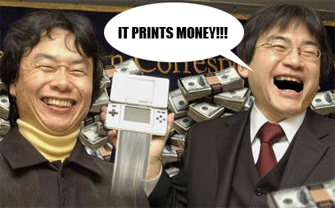
the video game industry is far ahead of the growth curve than that of its most easily identified cousins, the music and movie industries - most of this is down to technology aiding it ahead, but at the same time it has grown alongside many technical advances, namely the Internet. This is why it will be more relevant sooner - as the old fuddy-duddy traditional forms of media try and figure out how to wedge their square-shaped medium in the round hole of the Internet, the gaming culture that grew up alongside Al Gore's greatest contribution to society and is integrally tied into it will gain a foothold.
the reason it will keep that foothold: interactivity and bringing in aspects from many other forms of media. As gaming expands, I think that some great writers will (as they once moved from writing plays to movies to television) begin to pen some great stories and create grandiose worlds (as if enough don't already exist in gaming!). Directors who once would have made TV shows or films will bring their creative minds and, instead of relying on cameramen and now CGI designers, will work hand-in-hand with programmers, coders and 3D artists. And, lastly, musicians will continue to create great sweeping soundtracks, though with the proliferation of streaming content into games (think live, changeable billboards within games sooner rather than later, and build upon the idea), its very possible that radio stations within games such as the Grand Theft Auto series could become at the least updated, but possibly even real-time in the future. With the expansion of MySpace as the independent musician’s best friend, maybe some of those artists will get plucked and have their songs transported from Murdoch’s space for friends directly onto Xbox Live or the PlayStation Network and into new games?
And those are just ideas I came up with off the top of my head. Think about when people are given time to mold their thoughts.
The video game industry is poised to become the leader: an interactive medium which brings in aspects from everywhere else, including that crazy Internet. What will hold it back? Becoming stale and same too soon.

another GTA? shoot me now.
is the video game industry old enough to stagnate? I sometimes get the sense that I have grown up alongside the industry - ok, minus the very early Atari days - and because that inevitably brings up questions as to how old *I* am I shy away from it...but age is important, because one would assume only a well-aged industry can slip into repetitiveness and need a jolt of energy.
Thankfully, two things have happened that have already started to provide that boot into gaming’s rear end: Nintendo’s commitment to creativity, and the development of an independent scene. I’ll deal with the latter at a later time, but let’s talk Big N right now.

OLD SCHOOL
Nintendo was the sameness creator for two “gaming generations” – generally defined within the culture as delineated by system generations; the current, Xbox 360/PS3/Wii landscape is thought of as the seventh generation, with the first generation including gaming dating up until 1985 when Nintendo’s seminal Nintendo Entertainment System (NES) was released in the United States a year after its successful Japanese launch. Growing up, parents co-opted the word “Nintendo” to mean video games, just as one would make a Xerox, blow their nose with a Kleenex or drink a Coke – it was the main evocative brand. Some argue the PlayStation brand is that now, but it’s become a big enough industry where the catch-all is not going to last much longer; it’s not NEARLY like it was in the early ‘90s in any case.

G-man totally works for Sony
Then something happened. Sony jumped into gaming, a few crucial breaks went their way and, much like when the TV series 60 Minutes began to collect large audiences and make money in the late ‘70s (altering the course of contemporary TV news to become more profit-driven), the romantic days are gone and in come the business suits. Nintendo tried with their Nintendo 64 system to retain the ways that had done so well in the past, but that was not a huge success; they tried to slightly alter the PlayStation and PlayStation 2 formula with the GameCube, but that was a commercial flop too.
However, both systems included critical successes that featured the traits Nintendo has always been known for: innovation, tradition, and the highest-quality production values in the industry all living together and making games that are fun. With their DS handheld, Nintendo made a bold attempt to simplify gaming and make a system based on innovation.
Guess which system is now the top seller week-in and week-out in Japan, and has sold tens of millions of units worldwide in its almost-three-year history. Yup, the DS.

yes, yes it does
Who knew games about cooking, surgery, and being an attorney – all utilizing innovative input methods, including touch screens and a microphone – would be such a hit? Apparently Nintendo.
They went the same direction with their Wii console, which has a controller that is fully motion-sensing, allowing the paradigm of game design to completely break open. Where before in a golf game one would pull a control stick back and release to simulate a golf swing, here you actually swing. The DS’successful Trauma Center game series was ported, and the player is a surgeon, using tools to cut and operate on screen. Famous Nintendo series The Legend of Zelda had the newest game launch on the console, and the controls were adapted for the new possibilities opened up.
Sony’s PLAYSTATION 3 launched at the same time; guess which one sits on store shelves, and which is sold out minutes after it gets in stock? Yup, the Wii.
Nintendo has clearly proven there is a market for innovation and simplistic fun inside the game industry. Too many people in recent years have focused on high-end graphics and complex gameplay mechanics; while many games with both are very good, Nintendo’s Wii and DS have proven you don’t necessarily need both to produce a game that is fun. Sure, there are stinkers on the DS and Wii too; they’re clearly not golden gifts from the Gods, created perfectly as he would want them to be (no, Nintendo fanboy, Miyamoto is not God incarnate), but human, albeit an above-average, extremely talented human.

its now known as the Wii, but Nintendo's system was originally called the Revolution...and it truly is one
But they have proven that an industry which threatens into a stagnant spiral of shooters, sports games, and hopping on bandwagons of gameplay design (if I see another game described as a GTA clone I’ll break somebody) does have room for innovation for innovation’s sake, for games as fun primarily and epic secondarily. Graphics are nice, 60-hour plus RPGs are fun, but sometimes you just need a quick break, and something innovative and fun that is high quality fits the bill.
Then again, considering the all-encompassing nature of gaming, maybe I shouldn’t be so surprised.


3 comments:
Oh, what a dizzying post. I really enjoyed it, though; engaging style.
By the way, thank you for blogrolling me. :)
Who knows where to download XRumer 5.0 Palladium?
Help, please. All recommend this program to effectively advertise on the Internet, this is the best program!
Dont touch WIKILEAKS, faked DEMOCRACY!!!
Thank for all
Post a Comment